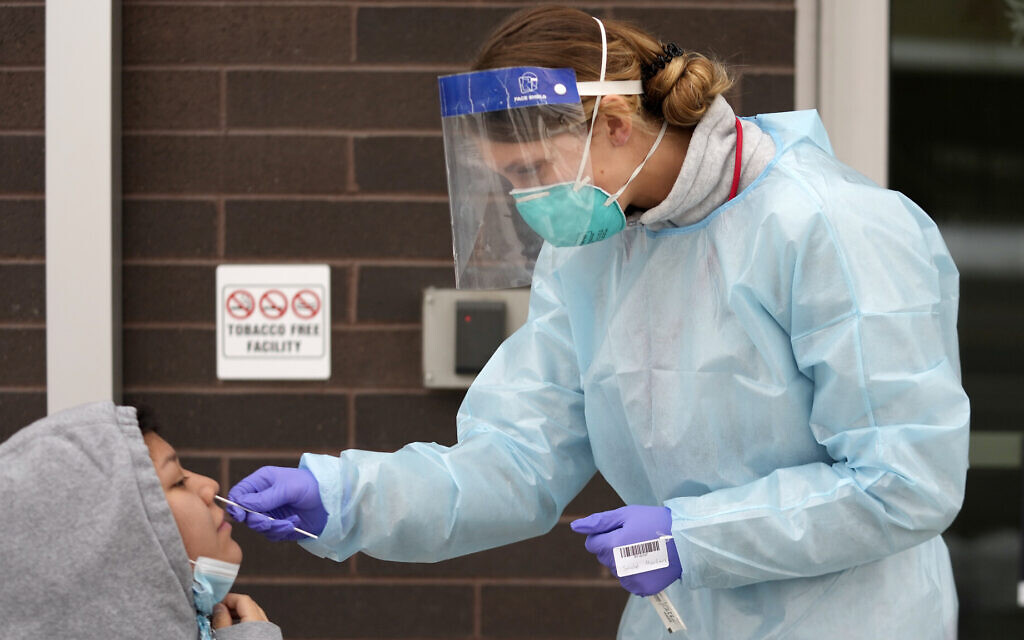‘A hell of a variant’: Ultra fast-spreading strain could shake Israel’s COVID calm
XBB.1.5 strain is dominant in the US after cases doubled in just a week, and could quickly start circulating in Israel; on plus side, variant-bolstered vaccines expected to help

COVID-19 experts around the world are watching with concern as the XBB.1.5 subvariant spreads like wildfire in the United States.
There aren’t yet confirmed cases in Israel. But some 41 percent of American cases are now categorized as XBB.1.5, doubling the number of diagnoses in just a week, making the strain dominant. And so, with significant travel between the US and Israel, it’s expected to only be a matter of time until it arrives in the Holy Land.
If it does, it could shake the relative COVID calm the country is enjoying now, with around 1,000 new confirmed cases per day, and falling deaths and serious cases.
Nothing like XBB.1.5 has been seen since late 2021, according to immunologist Dr. Yariv Wine of Tel Aviv University.
“It seems to be faster spreading than any other variant since Omicron emerged in November 2021 and then spread fast in early 2022,” Wine commented. “Virologists are calling it ‘a hell of a variant’ because it’s so transmissible.”
Dr. Eric Feigl-Ding, an epidemiologist and chief of the COVID Risk Task Force at the New England Complex Systems Institute, has called XBB1.5 a “super variant.”

XBB.1.5, which is mutated from the original Omicron strain, appears to be spreading faster than others because it is better at attaching itself to human cells.
“A mutation in the virus is located at the site where it binds to the human cells,” said Wine. “To effectively infect humans, the virus needs to bind to cells, and XBB.1.5 seems to do this very tightly.”
However, he said that its ability to spread may be exaggerated by the latest statistics from the US, as they follow a season of Christmas gatherings and parties during which social contact is higher than normal.

There are no indications that the variant is more severe than others, or that it involves different symptoms, Wine said, adding: “We actually have the tool kit to deal with this, in the form of bivalent vaccines.”
These are the vaccines that have been tweaked to respond better to later variants, which are available in many countries, including Israel.
The New England Journal of Medicine recently published a research letter, concluding that compared to people who received regular vaccines, “persons who received the BA.5-containing bivalent booster had better neutralizing activity against all Omicron subvariants.”
Wine said: “There are indications that the bivalent booster gives better protection against all Omicron subvariants. And while we don’t know yet how well it does against the latest variant, from what we know so far there is no reason to think it will be different.”
Vaccines aren’t expected to halt infection, but are expected to limit severity.
“As such, if vulnerable people are not boosted in the last four plus months they are recommended to get the bivalent booster,” said Wine. “This can reduce the number of severe cases.”
There's no paywall on The Times of Israel, but the journalism we do is costly. As an independent news organization, we are in no way influenced by political or business interests. We rely on readers like you to support our fact-based coverage of Israel and the Jewish world. If you appreciate the integrity of this type of journalism, please join the ToI Community.

We’re really pleased that you’ve read X Times of Israel articles in the past month.
That’s why we started the Times of Israel eleven years ago - to provide discerning readers like you with must-read coverage of Israel and the Jewish world.
So now we have a request. Unlike other news outlets, we haven’t put up a paywall. But as the journalism we do is costly, we invite readers for whom The Times of Israel has become important to help support our work by joining The Times of Israel Community.
For as little as $6 a month you can help support our quality journalism while enjoying The Times of Israel AD-FREE, as well as accessing exclusive content available only to Times of Israel Community members.
Thank you,
David Horovitz, Founding Editor of The Times of Israel









